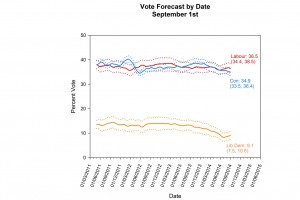As explained in the inaugural election forecast, up until May next year the Polling Observatory team will be producing a long term forecast for the 2015 General Election, using methods first applied ahead of the 2010 election (and which are also well-established in the United States).
The authors’ method involves trying to make the best use of past polling evidence as a guide to forecast the likeliest support levels for each party in next May’s election, based on current polling, and then using these support levels to estimate the parties’ chances of winning each seat in the Parliament. A seat-based element will be added to this forecast at a later date.
 This month’s Polling Observatory reported falls in support for both Labour and the Conservatives. Our forecast again finds the parties locked in a statistical dead heat, although Labour has edged up slightly, by 0.3 points, to 36.5%, and the Conservatives have slid back further, down 0.6 points to 34.9%. The continued stagnation in the polls is starting to harm the Conservatives in our forecast, with a slight widening of the gap between the parties.
This month’s Polling Observatory reported falls in support for both Labour and the Conservatives. Our forecast again finds the parties locked in a statistical dead heat, although Labour has edged up slightly, by 0.3 points, to 36.5%, and the Conservatives have slid back further, down 0.6 points to 34.9%. The continued stagnation in the polls is starting to harm the Conservatives in our forecast, with a slight widening of the gap between the parties.
This reflects the fact that the Conservatives have been unable to make gains that history would suggest, while Labour’s support has proved more resilient than expected. Indeed, the trend in our forecast for the Conservatives has been steadily downwards over the past year. A key factor in this may be the continued strength of UKIP, which has no historical precedent and may have upset the traditional pattern of Conservative recovery as polling day approaches.
The Conservatives’ inability to make any progress in polling over the past four months means that time is running out for them to deliver the shift in opinion needed to top the poll. Our forecast will continue to fall if the polls remain unchanged. There is a little good news, for a change, in our forecast for the Liberal Democrats, with their predicted vote rising 0.9 points to 9.1%. This would still inflict substantial electoral losses on the party, however the magnitude of these losses is likely to depend more on the Liberal Democrats’ local strength than their national polling.
Surprise events such as the defection of Douglas Carswell from the Conservatives to UKIP and the fierce contest over the referendum on Scottish independence – with the result still in the balance – demonstrate just how much uncertainty remains concerning the result of the general election to be held in 2015 (with even the timing of the election itself now thrown into doubt). Our forecasts do, however, provide some indication of whether the parties are performing above or below their historical expectations – and the likelihood of their gaining or losing support as Election Day approaches.
